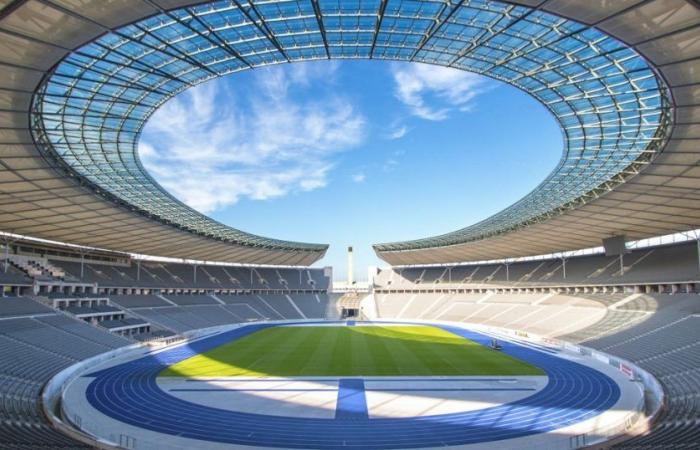The nation hosting Euro 2024 is Germany, which has already organized very important football events such as the world championships in the past. The stadiums where the matches will take place are ten in total and are scattered throughout the country, from North to South. The appointment for the Final, however, is in Berlin, in the setting of the Olympiastadion. Here, then, which are all the stadiums that will host the European Championships.
Allianz Arena, Munich
The Allianz Arena, home of Bayern Munich, is among the most famous sporting facilities in the country. This modern sports facility, opened in 2005, is known for its external façade made up of panels that can light up in various colors. Opened in 2005, the Allianz Arena has a capacity of 75,000 spectators, making it among the largest stadiums in Germany. The semi-final of the European Championship will be held here.
Westfalenstadion (Signal Iduna Park), Dortmund
The Westfalenstadion, better known as Signal Iduna Park for sponsorship reasons, is one of the most famous and loved stadiums in Germany. Located in Dortmundin the Ruhr this facility is famous for the incredible atmosphere that its fans are able to create, the so-called “yellow wall”. Originally built in 1974, Signal Iduna Park has undergone various modifications and expansions over the years, reaching a current capacity of approximately 81,365 spectators.
Olympiastadion, Berlin
Berlin’s Olympiastadion, with its rich history and impressive architecture, is one of Germany’s most emblematic stadiums. Located west of the center, this stadium is a true sporting and cultural symbol. Originally built for i 1936 Olympic Gamesthe Olympiastadion has undergone several renovations over the years, the last of which was before the 2006 FIFA World Cup. With a capacity of approximately 74,475 spectatorsthe Olympiastadion is ideal for hosting a large-scale event.
RheinEnergieStadion (Cologne Stadium), Cologne
The RheinEnergieStadion is one of the architectural jewels of Cologne, a city located on the Rhine, and is located in the Müngersdorf district. Originally built in 1923, underwent a complete renovation in 2004 to meet international standards and increase its capacity. Today, the RheinEnergieStadion can accommodate up to 46,000 spectatorsmaking it ideal for some group matches and a round of 16 match.
Arena AufSchalke (Veltins Arena), Gelsenkirchen
The Arena AufSchalke, also known as Veltins-Arena, is located in Gelsenkirchen, in the heart of the Ruhr region. Opened in 2001, this modern structure is famous for its retractable roof and the sliding football pitch, making it one of the most innovative arenas in Europe. With a capacity of approx 62,271 spectatorsthe Arena AufSchalke is ready to host three group matches and a round of 16 match.
Volksparkstadion, Hamburg
The iconic Volksparkstadion is located in Hamburg, a port city in northern Germany. The stadium hosts HSV’s home matches. Originally built in 1953 and completely renovated in 2000, it has hosted international matches, including those of the 1974 and 2006 World Cups. Here, in addition to four group matches, it will take place a quarter-finalbeing able to accommodate 57,000 people.
Merkur Spiel-Arena, Düsseldorf
Located in the cosmopolitan city of Düsseldorf, the Merkur Spiel-Arena represents an important point of reference for sporting and cultural events in Germany. Opened in 2004, the Düsseldorf Arena has a capacity of 54,600 spectators and complete coverage of the stands. During UEFA EURO 2024, it will host three group matches, a round of 16 and a quarter.
Red Bull Arena, Leipzig
The Red Bull Arena in Leipzig is one of the most modern and functional stadiums intended to host the 2024 European Football Championship matches. Located in the vibrant city of Leipzig, this facility was originally built for the 2006 Football World Cup within the old city stadium. Ready to host approx 42,959 spectatorsthe Red Bull Arena is on the competition calendar for three group games and one round of 16.
MHP Arena, Stuttgart
There MHP Arena Stuttgart represents another iconic location for European football. A city well known for its typical cuisine, it also has a very large stadium, around 60,000 spectators, generally used by the main local team. For the European Championships it will be the home of four group matches and a quarter-final.
Waldstadion, Frankfurt
The Waldstadion or Deutsche Bank Park is among the oldest football facilities in the country (inaugurated in 1925), but also one of the most advanced, thanks to its recent renovation. Today, it boasts a capacity of approx 51,500 spectators, is surrounded by multi-sports spaces and has a system that allows the field to be covered in case of rain. Four group matches and a round of 16 match will be played here.






